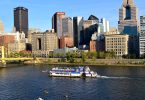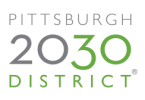Vivien Li became the President and CEO of Riverlife in 2015 by way of Boston.
In Boston, Li headed The Boston Harber Association, a non-profit organization which fosters a clean and accessible Boston Harber for more than two decades. At Riverlife, Li works to reclaim, restore, and promote Pittsburgh’s riverfronts as the environmental, recreational, cultural, and economic hub for people of the region and visitors.
Since 1999, Riverlife has worked to implement a vision plan for a downtown riverfront park system known as Three Rivers Park. Through Riverlife’s leadership in working with property owners, more than 82% of the thirteen mile Three Rivers Park loop has been established and improved for public use.
Another Riverlife effort includes co-leading the committee that commissioned “Energy Flow,” a lighting installation on the Rachel Carson Bridge that debuted in November 2016 for the Pittsburgh Bicentennial Celebration and continued through 2017. The electricity to power “Energy Flow” is generated by wind turbines fabricated by WindStax, a wind turbine manufacturer located in Pittsburgh’s Strip District.
A key factor in Li’s decision to come to Pittsburgh was the strong collaboration between government, business, and the not-for-profit community. “Pittsburgh has very enlightened leadership in all sectors,” Li says. “At Planning Commission meetings, project proponents will sometimes begin with a discussion of LEED certification or how they are part of the Pittsburgh 2030 District.” Li also adds that “Pittsburgh is very fortunate to have committed and generous foundations,” who make it “possible for so many organizations to work towards a more sustainable community.”
Li believes that in order for Pittsburgh to become a truly sustainable city, there must be “much less dependence on individual private automobiles for mobility in the region, and far less of our riverfronts devoted to the parking of cars.” This will come to fruition, she adds, when the city establishes a “clean-energy water transportation system which connects people to places to live, work, and play.”
In April 2018, Li announced she was resigning from Riverlife citing personal reasons. Li has returned to Boston.










